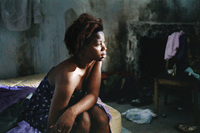The Wound (La Blessure) opens to an unhurried, long take, static shot of a man lying near motionless on the mattress on the floor of a cramped, dingy apartment, seemingly waiting for something to happen. The ringing of a telephone breaks the visual monotony of the frame as a man named Papi (Adama Doumbia) crosses in front of the camera to answer the call and upon hearing that his wife Blandine’s plane has arrived at Charles de Gaulle Airport, leaves the apartment to meet her. Meanwhile, Blandine (Noëlla Mossaba) and several other non-native passengers have been detained by the police behind the locked doors of an undisclosed location within the back rooms of the airport for improper documentation. Pleading to no avail of their intention to file for asylum, the undocumented immigrants are held for hours at the holding facility, unable to contact their loved ones (and who, in turn, are cursorily driven away by officials claiming that there is no record of them having even arrived at the airport), withheld food, drink, and hygiene facilities, and subjected to humiliating strip searches, intrusive health examinations, and interrogations before being forcibly scuttled under the cloak of darkness into a crowded transportation van for placement into planes flying back to their native country. However, in the officers’ barbaric haste to install the detainees surreptitiously into the van before the arrival of the airport travelers at the gate for boarding, Blandine’s leg becomes trapped in the prematurely closed doors of the vehicle, aborting their attempts to load the passengers onto the plane for immediate deportation. Returned to their cramped holding facility, a representative from the Ministry of Foreign Affairs on a routine spot-check of the airport observes the obvious mistreatment of the detainees and decides to intervene on their behalf, coaching them on the proper channels of contact to petition for asylum, insisting that Blandine be sent to a hospital for proper medical assistance, and filing a report to his superiors on the inhumane treatment of the asylum seekers that he has witnessed. The representative eventually succeeds in obtaining a last-minute faxed injunction to stop the deportation of the detainees (after receiving a blunt reproach from his supervisor not to continue to overstep his jurisdiction over the immigration office), and soon, Blandine and Papi are reunited. Nevertheless, the trauma of her detention continues to haunt Blandine in her new life as her optimism, geniality, and resolve give way to psychological inertia, estrangement, and enigmatic silence. Inviting favorable comparison to the overtly political, social realist films of Jean-Pierre and Luc Dardenne, The Wound is an understatedly affecting, acutely observed, and profoundly sobering portrait of oppression, dehumanization, and exclusion. By incorporating organic, extended plan-sequences and using repeated images of interminable waiting – from Blandine’s detention, to her self-confinement at a derelict tenement, to Papi’s real-time ride through the countryside in the back of day laborer truck – Nicolas Klotz reflects the inherent inadequacy (if not outright failure) of immigration and asylum laws, lax procedural structure, and government-tolerated, often racially motivated policies (and undocumented, obstructive common practices) that willfully hinder or impede the integration and assimilation of immigrants into their adoptive countries. Using the treatment of Blandine’s wound while in French custody as a metaphor for the authorities’ repeated turning of a blind eye to the obvious, visible social problem, the film serves as a harrowing and trenchant exposition on intolerance and systematic marginalization.
© Acquarello 2005. All rights reserved.
